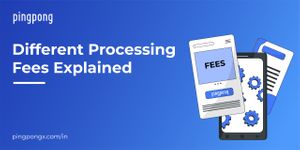Introduction
Online payments have captured the mind of professionals, businessmen, and millions of individuals. Life has become convenient and payments are faster than usual. It does not confine to domestic payments only but has extended to cross-border transactions.
Though the transfer of funds may look simple on the front, but on the back it takes in several phases. In a single transaction, the receiver has to pay a cost for using the financial service platform.
Online payments are now a lifestyle-driven activity.
Ever since people have realized the ease and comfort of shopping online, digital payments trends have taken their way up. As a result, when businessmen expanded their business outside the country, they took significant advantage of online platforms to receive money. As a result, online merchandise and professional services have contributed to the GDP of the country and boosted the local economy.
Despite the deductions of various fees, India retained the top spot with 25.5 billion real-time payments in 2020. This is attributed to an improved digital financial infrastructure in our country.
Table of Contents
- What are payment processing fees?
- The concept of Online Payment.
- Type of cross-border payments.
- Types of payment processing fees.
- Payment with PingPong: Redefining "Secured" Transactions.
- Factors that affect international payment fees.
- Conclusion
What are the payment processing fees?
Any online payment includes these four entities: payer, receiver, acquiring bank, and the issuing bank. All of these need a connector, that is a payment processor, to iron out the folds.
A payment processor is a switch between these entities allowing the easy transfer of funds. The payment solution provider validates the payment and keeps the financial data safe. For a smooth transaction, the processor charges a fee. Let us understand what it is?
Payment processing fees refer to the cost the business owners or professionals' bear when they receive payments from customers or clients online. Carrying hard cash appears to be troublesome; hence people prefer to pay by card or online instead. The receiver will have to pay a fee to process the transaction.
The amount of payment fees depends on factors like:
→ Risk of the transaction.
→ Type of card.
→ Currency conversion fees.
→ Transaction fees
The Concept of Online Payment Processing.
Before understanding the factors that affect international payment processing, let us understand the online payment process.
In any digital transaction, the business owner and the customer are the two main parties involved. But for the transfer of funds, a technological platform like a payment gateway or a payment processor is needed.
The ecosystem can be complex when you receive payment from across the globe. It involves several fees to complete a fund transfer. Let us understand the involving fees with the two examples:
- Suppose you are a seller who sells products through e-commerce websites. For hassle-free execution, you listed the product prices in US dollars. Now, a customer makes the payments via a credit card. Making payment for the purchase using the card can be a simple affair. Now, if you have a US-based merchant account, there will be no need for currency conversion fees. But you will have to pay flat fees, interchange fees, etc.
- Think you are a seller from India and want to sell your products in the USA. You use a payment gateway or a payment processor for a convenient transaction. In case you use PingPong as your payment facilitator, you can make a virtual account on PingPong US and do the same for PingPong India. After you transfer the money between these two accounts, you can further transfer the amount to your local bank account. This kind of transaction will involve currency exchange fees and transaction fees.
Out of the two, payment using a third party platform is safe as all the financial data like card details is kept safe. Let us look in detail about the type of cross border payments.
Types of Cross Border Payments.
Payment processing fees will depend on the type of cross-border payment. Let us at first look at the types of cross-border payments:
→ Credit Card Payments:
Paying through credit cards is an option for many customers, especially when you talk of cross-border payments. It deals with processing from credit card networks and acquiring banks.
→ Bank Transfers:
Banking transfer is another way to move the currency over the internet. But the banks, in this case, will have a limited range of currencies stocked. So the customer will have to wait to make the payment.
→ eWallets:
eWallet like PingPong are digital wallets that operate on software. Customers can pay for their online transactions with eWallets. These eWallets allow the customers to store the information of their credit cards safely. The best feature eWallets support includes multi-currency operations, which is a limitation with a bank transfer. Another noteworthy point is that a cross-border payment is complete only when the merchant transfers the money to their local bank account from eWallet.
Different International Payment Processing Fees
Under these categories, you can now understand different payment processing fees.
Here are the different payment processing fees explained:
- Flat Fees: Flat fees are the payment plans where the payment processor charges a fee for the transaction carried. It does not depend on the type of the card, brand, etc. Flat fees are charged as a percentage of the transaction amount or as a percentage of the purchase. New businesses that do not have bulk transactions prefer this fee, but the payment is made through credit cards.
- Cross-border fees: Cross border fees is a component of the online fund transfer. It is the fee charged to the merchant when customers make the payment using a credit card in countries beyond the domestic territories.
- Transaction fees: The transaction fees refer to the cost a business has to pay every time it processes a customer's payment. The customer needs to pay the transaction fees after they make an electronic payment. Most of the time, the payment processors charge a fixed percentage of the amount received from the customer. For example, PingPong uses lowest commission transaction fees to accept global payments. It is the lowest in comparison to other payment processors.
- Currency Conversion fees: Currency conversion fees is the amount the credit or debit card payment processors levy to convert one currency to another. If you exchange money from one currency to another, the bank or the payment processor will apply a currency exchange fee. But what is it?
Currency exchange fees are the difference between the exchange rate the money operator decides to apply and the real exchange rate traded. For example, if you are an eCommerce seller who sells your local handicraft products in the USA, the amount you receive will suffer the deductions in the name of the currency exchange rate. The fees vary from one processor to the other. But with PingPong, you do not have to pay the currency exchange fee separately.
For every transaction, the service provider charges you lowest commision of the amount received, all-inclusive.
Payment with PingPong: Redefining "Secured" Transactions.
PingPong is the second-largest payment processor in the world. It has its presence across significant eCommerce sellers and large freelance market platforms. But why trust the service provider?
- PingPong is the most compliant authority that takes care of all the international transactions to protect the money.
- In India, RBI approves the payment and has authorized PingPong as the online payment gateway service provider to facilitate payment services.
- Speaking of security, PingPong is regulated under the EU's General Data Protection Regulation and the 23 NYCRR 500, the New York Department of Financial Services cybersecurity regulations.
Factors that affect international payments.
Here are the factors that affect the international payment processing fees:
- Regulations and compliances of different countries.
- The political situation between the two countries.
- Economic factors that govern a country.
- Level of the risk of the transaction.
Final Thoughts:
Businesses are not profitable until you make as well as save money. If you are an international player and carry the business beyond your borders, the first thing you need to care for is your customers, and the second is the payment type. Try to maximize your profits and make sure you offer the best payment experience to your customers. The overall mechanism of cross-border payments can be complicated, which is why payment processors have found a place. Their purpose is to boost businesses with low cost and secure payment solutions.

